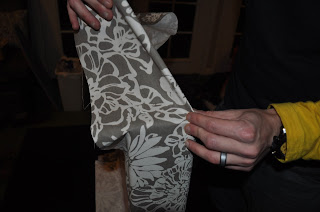My husband has been angling for a new coffee table ever since...well, ever since he lost the battle for choosing the first one.
Our current table was looking a bit worn and dinged up, so I gave him free reign to come up with our next one. He had pinned this DIY Ikea table blog a while back and it seemed like a good fit for our living room.
You can follow the link to the original blog by clicking on the picture above.
First, we started with one of the Lack Ikea tables for $8-$10. The black/brown color that matches our tv stand was the more expensive of the two (a fact that we learned only after we walked 3.75 miles around a one-way Ikea-shaped maze).
The other blogs we researched showed how to cut the foam from large sheets sold at Home Depot, in order to save money; however, what we didn't like was the wasted foam edges. Enter Joanns! During one of our weekly trips, we noticed they stocked pre-cut foam,and best of all, the size was almost perfect! (the lack table is 21-5/8" x 21-5/8", and the foam was 22" x 22") We decided on the high-density version of the foam as it would deflect less for placing plates and glasses on it.
After aligning the foam and table top, we discovered that the slight difference in size gave the table a flared effect which we kind of liked. We used a spray adhesive to fix the foam to the tabletop, which provides a secure fit.
Need to be sure that it is comfortable... ahhh!
Next, we bought some batting to soften the edges of the foam and the tabletop.
We used the staple gun to mount the batting on the underside of the table.
Be sure to trim the excess batting on all edges and around the mounting holes for the legs.
Next we chose a heavy duty fabric to finish the ottoman.
We started stapling the material on one edge. Then pull the material taut opposite the first side and staple into place. Be sure the material is being pulled evenly so you do not end up with any strange creases in the top.
My hubby knows his way around a staple gun!
How to finish the last two sides? Here are a series of pictures showing how we folded the corners to ensure a smooth and neat finish.
First we pulled the material flat around the corner.
We stapled the material down to the corner to fix it into place.
Next we pulled the material taut along its long edge.
We folded the material along the edge of the corner.
We then folded the material over to the bottom of the tabletop.
Staple in place.
Repeat on last side.
Be sure to trim the excess material away and the clear the material from the mounting holes for the legs. We had to use a utility knife and a hole punch to clear the holes sufficiently.
We chose to cut our legs shorter to match the height of our couch. FYI, the insides of the LACK legs are hollow. If you want to prevent the legs from scratching your floors, you may want to look into using adhesive furniture pads or cork boards. Ours are on a carpet, so it was not an issue for us.
These work great as an ottoman, a coffee table or even a stool (though IKEA would disagree).
They are very functional and a great addition to our living room decor.
These work great as an ottoman, a coffee table or even a stool (though IKEA would disagree).
They are very functional and a great addition to our living room decor.




















